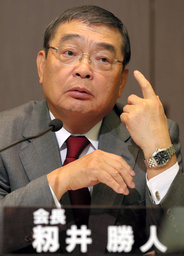 Source: banmakoto.air-nifty.com
Source: banmakoto.air-nifty.com During a press conference held on the 25th of January, recently appointed chairman of the NHK corporation, Momii Katsuto (70), when asked a question regarding demands by the South Korean government for compensation to those women forced to work as ‘comfort women’ during Japan’s imperial expansion period, responded by saying that while morally it was abhorrent to modern sensibilities, all countries had done it in the past. While claiming to be speaking off the record, Momii then went on to voice his objections to South Korea’s insistence on reparations, asking why it was that only Japan was being singled out for using ‘forced prostitution’, and that since South Korea had signed an agreement with Japan foregoing any claims of compensation, it was ‘odd’ that South Korea kept bringing it up (J). Momii later rescinded everything he said at the press conference, yet the repercussions had already begun (video of that press conference can be seen here).
On the 4th of February, a member of the NHK steering committee, novelist Hyakuta Naoki, attended a street rally at the western entrance of Shinjuku Station for Tokyo gubernatorial candidate Tamogami Yoshio, himself a noted rightist and social conservative. During the course of his rally speech, Hyakuta brought up US complicity in the bombing of Tokyo and the role of the Far East Trials to ‘absolve the US of its role in perpetrating a massacre’. He went on to deny that the Nanjing Massacre ever took place, and that in war all countries engaged in acts of wanton destruction. Hyakuta declared himself in favour of constitutional revision, and, in time honoured rightist tradition, called for the education system to be reformed to instruct Japan’s children on the ‘brilliance of the Japanese nation’ (J).
The Asahi Shimbun was quick to point out that such pronouncements were contrary to the articles of Japan’s broadcasting law (J), which states that members of political parties cannot become executives in the NHK organisation, that neutrality and balance of opinion must be maintained by the NHK, and that no NHK board members must engage in acts which would bring the organisation into disrepute. While one could be forgiven for regarding this as another spat between the national broadcaster and its rival network, its implications for broadcasting in Japan are quite serious.
For starters, members of the executive board of the NHK are chosen by the government of the day, meaning that in the case of Momii, he was plucked by the Abe government from a position at Unisys Japan to serve as chairman of a national broadcaster responsible for the dissemination of information both domestically and abroad. As a majority of Japanese citizens rely on the NHK to inform them of social, political, and economic developments, any hint that the rigorous neutrality that the NHK has heretofore exercised is under threat causes waves among media commentary in Japan.
Of course, one could point out that in terms of program content, NHK does not exactly push the boundaries of controversy, with a majority of its broadcasting devoted to nature and cuisine documentaries, daytime dramas, chat shows and arts programs. Whatever news NHK conveys is seemingly devoid of bias, although the fact that the NHK is an integral part of the notorious ‘National Press Club’, an exclusive gathering of news organisations whose rely upon the ‘club’ to provide access to the government and which has been accused of shielding the government of the day from criticism in exchange for favourable treatment by the bureaucracy (J), does raise questions about its dedication to objectivity.
The fact that Chairman Momii made those particular comments has led to calls for his resignation and the appointment of someone more ideologically ‘neutral’. However this may be easier said than done. PM Abe has made no secret of his opinions regarding Japanese identity and historical revisionism. Yet he categorically denied placing any political pressure on the NHK in 2005 during his first term in office when allegations were raised by the Asahi Shimbun that the LDP had demanded that an NHK program dealing with Imperial Japanese war crimes be edited so that it did not reflect on either the actions of the army of the day, nor call into question to complicity of the Imperial Household in allowing such crimes to go unpunished (J).
As Momii was appointed by Abe, it feeds into the growing belief that Abe is embarking on yet another attempt to re-define Japanese identity and ensure that a more rightist point of view is promoted by the nation’s media. Momii certainly believes that the role of the public broadcaster, particularly when broadcasting overseas, is to adhere to the government’s line (which in itself is revelatory, and quite interesting in lieu of developments in Australia over the past week concerning the role of its public broadcaster and its relationship with the government of the day). While NHK’s domestic news broadcasts haven’t had any discernable change towards rightist views, it may prove useful to monitor the type of programs being released by NHK over the next twelve months to see if Momii’s opinions do trickle down to the director’s floor.
 RSS Feed
RSS Feed